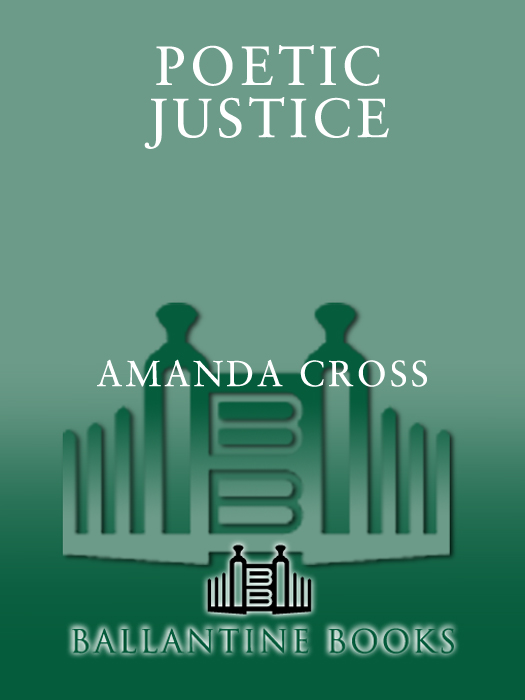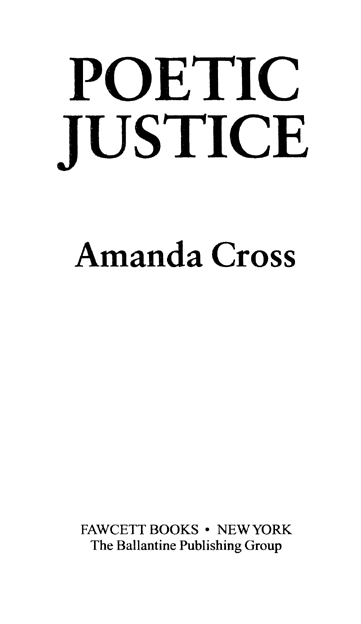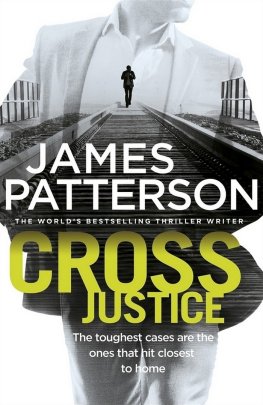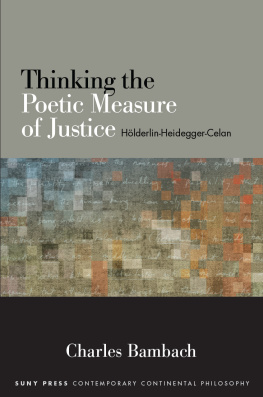Amanda Cross - Poetic Justice
Here you can read online Amanda Cross - Poetic Justice full text of the book (entire story) in english for free. Download pdf and epub, get meaning, cover and reviews about this ebook. year: 1991, publisher: Avon Books (Mm), genre: Detective and thriller. Description of the work, (preface) as well as reviews are available. Best literature library LitArk.com created for fans of good reading and offers a wide selection of genres:
Romance novel
Science fiction
Adventure
Detective
Science
History
Home and family
Prose
Art
Politics
Computer
Non-fiction
Religion
Business
Children
Humor
Choose a favorite category and find really read worthwhile books. Enjoy immersion in the world of imagination, feel the emotions of the characters or learn something new for yourself, make an fascinating discovery.

- Book:Poetic Justice
- Author:
- Publisher:Avon Books (Mm)
- Genre:
- Year:1991
- Rating:5 / 5
- Favourites:Add to favourites
- Your mark:
- 100
- 1
- 2
- 3
- 4
- 5
Poetic Justice: summary, description and annotation
We offer to read an annotation, description, summary or preface (depends on what the author of the book "Poetic Justice" wrote himself). If you haven't found the necessary information about the book — write in the comments, we will try to find it.
Poetic Justice — read online for free the complete book (whole text) full work
Below is the text of the book, divided by pages. System saving the place of the last page read, allows you to conveniently read the book "Poetic Justice" online for free, without having to search again every time where you left off. Put a bookmark, and you can go to the page where you finished reading at any time.
Font size:
Interval:
Bookmark:

and her Kate Fansler novels
If by some cruel oversight you havent discovered Amanda Cross, you have an uncommon pleasure in store for you.
The New York Times Book Review
Amanda Cross writes wonderfully witty mysteries full of well-developed characters and insights on modern foibles.
United Press International
Cross is wise in the ways of academe, and her figures speak in literate, complete sentences, which surely is a requirement for nuanced ambiguity.
The Boston Globe
Treat yourself to some of the best mysteries around, and read all the Kate Fansler novels. You wont be disappointed.
Bay Area Reporter
Cross remains queen of the American literary whodunit.
Publishers Weekly
By Amanda Cross
Published by The Ballantine Publishing Group:
THE THEBAN MYSTERIES
POETIC JUSTICE
DEATH IN A TENURED POSITION
IN THE LAST ANALYSIS
THE JAMES JOYCE MURDER
THE QUESTION OF MAX
SWEET DEATH, KIND DEATH
NO WORD FROM WINIFRED
A TRAP FOR FOOLS
THE PLAYERS COME AGAIN
AN IMPERFECT SPY
THE COLLECTED STORIES
THE PUZZLED HEART
HONEST DOUBT

Published by The Ballantine Publishing Group
Copyright 1970 by Carolyn G. Heilbrun
All rights reserved under International and Pan-American Copyright Conventions. Published in the United States by The Ballantine Publishing Group, a division of Random House, Inc., New York, and simultaneously in Canada by Random House of Canada Limited, Toronto. Originally published by Alfred A. Knopf, a division of Random House, Inc., in 1970.
Grateful acknowledgment is made to Random House, Inc., for permission to reprint excerpts from W. H. Auden: Collected Poems by W. H. Auden, edited by Edward Mendelson. Copyright 1976 by Edward Mendelson, William Meredith, and Monroe K. Spears, Executors of the Estate of W. H. Auden.
Fawcett is a registered trademark and the Fawcett colophon is a trademark of Random House, Inc.
www.randomhouse.com/BB/
Library of Congress Catalog Card Number: 00-109381
eISBN: 978-0-307-80210-1
v3.1
It will, of course, be obvious to every reader
that the quotations at the heads of the chapters,
and most of the poetry scattered reverently
throughout this work,
are from the writings of W. H. Auden.
The author is grateful to Random House, Inc.,
for its permission to quote from the
copyrighted works of Mr. Auden.
Before Death
And where should we find shelter
For joy or mere content
When little was left standing
But the suburb of dissent?
Death and After
Truth was their model as they strove to build
A world of lasting objects to believe in,
Without believing earthenware and legend,
Archway and song, were truthful or untruthful:
The Truth was here already to be true.
Before Death
though one cannot always
Remember exactly why one has been happy,
There is no forgetting that one was.
P ROFESSOR K ATE F ANSLER mounted the stairs to the upper campus where the azalea bushes were just coming into bud. She did not yet know, on that May morning, that the students had already occupied the administration building. Few knew as yet; tomorrow, it would be front-page news around the world. Now she walked past lawns just turning rich with green. The students, damn them, were trampling thoughtlessly across the new grass, heedless of all the cautionary signs and fences erected by the Universitys tireless gardeners. The annoyance she had always felt at this desecration had grown, if anything, more acute with the years. She reprimanded herself for crotchetiness. unready to die, Kate thought, but already at the stage when one starts to dislike the young. The lines were Audens and, as always, they gave Kate special pleasure. She was going that afternoon to see him receive a gold medal for poetry.
Kate had never met Auden and was unlikely ever to do so. Yet there had existed between them for over ten years what she considered to be the perfect relationship. That it was wholly satisfactory to Auden was to be inferred from the fact that he had never heard of it; its satisfactions for Kate rested securely on the knowledge that he never would. Audens private person did not interest her. But, over the years, his poetry and such delightful facts about him as appeared in books by his friends had given her a new awareness of life. She had never read a word of criticism or scholarship about him and, safely and professionally ensconced as she was in the Victorian period, planned never to do so. Which just goes to show, as, indeed, did everything happening that day, that foresight is not a human attribute. At that very moment the students had opened the Presidents files and begun to read his letters.
Abruptly mounting her ramshackle wheel,
Fortune has pedalled furiously away;
but Kate, who did not know that, sat down and pleasurably regarded the newly blossomed tulips.
Kate had first seen Auden a decade before on a television program which, since she did not own a set, she had gone to considerable inconvenience to catch. (Her hosts had been more inconvenienced still, since the program had begun at nearly midnight and went on into the small hours of the morning; abandoning Kate, Auden, and their living room, they had finally gone to bed.) Kate could no longer remember the occasion for the program, nor exactly what Auden and the others had been discussing, but she did remember that throughout the long hours Auden had called loudly and unsuccessfully for tea: apparently as difficult to obtain in a television studio as Coca-Cola in a four-star Parisian restaurant. Kate had never forgotten Audens frown. Reportedly, he had been frowning since boyhood. I see him, Christopher Isherwood had written, frowning as he sings opposite me in the choir, surpliced, in an enormous Eton collar, above which his great red flaps of ears stand out, on either side of his narrow, scowling, pudding-white face. They had been at school together: Isherwood was to present Auden with his gold medal that afternoon.
And so, after all these years, I am forcibly evicted from my office. They have taken over the College building too.
Who has? Kate stared at the man standing beside her.
Fate, Frederick Clemance observed, has, I see, granted you some additional moments of blessed ignorance. And what were you thinking of, sitting there contemplating tulips?
Auden, Kate said.
You dont say? Clemance sat down beside her on the bench. Do you know his poetry well?
I browse in it, Kate admitted, as though it were a meadow. She regarded Clemance with a certain degree of discomfort. She had admired him for years, had studied with him as a graduate student (which for a woman had been a singular honor indeed), had followed with interest and devotion his growing reputationhe was now one of the Universitys luminaries. She was, indeed, technically speaking, his colleague, but she had never before chatted with him.
There they go, you see. Crawling around the ledges like so many monkeys and shouting obscenities. If you come close enough, they will spit down on you. Can it be a new form of panty-raid? At least, Clemance added, no one ever before involved me in that sort of escapade.
Font size:
Interval:
Bookmark:
Similar books «Poetic Justice»
Look at similar books to Poetic Justice. We have selected literature similar in name and meaning in the hope of providing readers with more options to find new, interesting, not yet read works.
Discussion, reviews of the book Poetic Justice and just readers' own opinions. Leave your comments, write what you think about the work, its meaning or the main characters. Specify what exactly you liked and what you didn't like, and why you think so.




